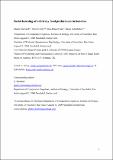Social learning of arbitrary food preferences in bonobos
Abstract
A fruitful approach to investigate social learning in animals is based on paradigms involving the manipulation of artefacts. However, tool use and elaborate object manipulations are rare in natural conditions, suggesting that social learning evolved in other contexts where fitness consequences are higher, such as discriminating palatable from noxious foods, recognising predators or understanding social hierarchies. We focussed on one such context by investigating whether bonobos socially learned others’ arbitrary food preferences through mere observation. To this end, we trained two demonstrators to prefer or avoid distinctly coloured food items, treated with either a sweet or bitter agent. Demonstrators then displayed their newly acquired preferences in front of naïve subjects. In subsequent choice tests, subjects generally matched their choices to the demonstrators’ preferred food colours, despite having already tasted the equally palatable colour alternative. Both age and exposure to demonstrator preference had a significant positive effect on the proportion of matched choices. Moreover, in a context where errors can be costly, social learning was instant insofar as six of seven subjects used socially learned information to influence their very first food choice. We discuss these findings in light of the current debate on the evolution of social learning in animals.
Citation
Shorland , G , Genty , E , Guéry , J-P & Zuberbuhler , K 2019 , ' Social learning of arbitrary food preferences in bonobos ' , Behavioural Processes , vol. 167 , 103912 . https://doi.org/10.1016/j.beproc.2019.103912
Publication
Behavioural Processes
Status
Peer reviewed
ISSN
0376-6357Type
Journal article
Description
The research leading to these results has received funding from the European Research Council under the European Union’s Seventh Framework Programme (FP7/2007-2013) / ERC grant agreement n°283871 and the Swiss National Science Foundation (Social learning in primate communication: 31003A_166458 / Coordinating joint action in apes: Testing the boundaries of the human interaction engine: CR31I3_159655).Collections
Items in the St Andrews Research Repository are protected by copyright, with all rights reserved, unless otherwise indicated.

